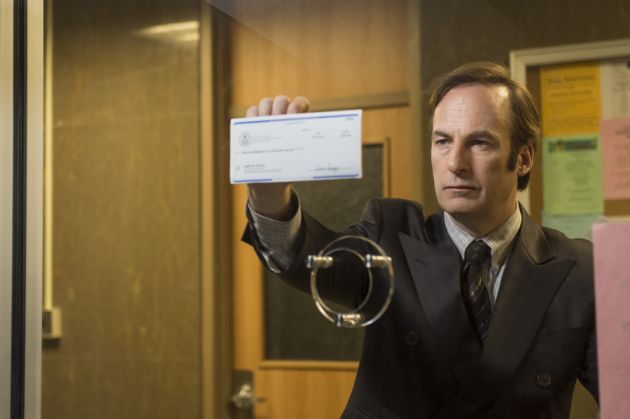Philly’s Court-Appointed Attorneys Are Getting Screwed

Bob Odenkirk as Saul Goodman (Ursula Coyote/AMC)
If the world has learned anything from Saul Goodman, it’s that the road to prosperity sure as hell isn’t paved in the salaries of court-appointed attorneys.
The first season of AMC’s Better Call Saul began with Goodman in his past life as James McGill, a court-appointed attorney whose frustration with the court system — and life itself — went through the roof when his expected trial payments turned out to be a lot less than what he’d expected. Turns out similar scenes have been playing out in Philadelphia for quite some time.
A handful of court-appointed lawyers recently told the Legal Intelligencer that the city has been quietly slashing their fees during during the last several months. But the problem actually stretches back years, according to Benjamin Lerner, the former Common Pleas Court judge who serves as the city’s deputy managing director for criminal justice. “I’ve been hearing complaints like this going back to at least 2012,” he told Philadelphia magazine on Tuesday.
Screwing over lawyers who are tasked with making sure that cash-poor defendants get a fair trial seems, uh, wrong. How’d we get here? The backstory is a little complicated, but bear with us. Once upon a time, the First Judicial District was responsible for paying court-appointed attorneys. That job was handed over to the city in 2012. Sometimes the city was a little slow in getting payments out to attorneys, but the issue seemed to grow dramatically worse by late last year, when the Intelligencer reported that some attorneys had gone months without receiving money that was owed to them. The pay delays were easily explainable, Lerner said. The Counsel Fee Unit, which processes payments for court-appointed attorneys, had a manpower shortage.
“That was simply the outgoing [Nutter] administration probably not filling vacancies, and the people who remained were just swamped,” Lerner said. “The Kenney administration, within the last few months, has added personnel to that unit. From what I understand, the payments are getting better in terms of the timeliness.”
OK, that’s good. But why are attorneys complaining that they’re getting paid less? Some, like Chris Montoya, told the Intelligencer that their payments have dropped as much as $400 or more without explanation. The parameters of what court-appointed lawyers are supposed to make are laid out in a payment voucher that attorneys have to get judges to sign off on. The form is pretty cut-and-dry. But there are a couple of problems.
For one, the payment rates haven’t been updated in almost 20 years, Lerner said. (The rates were set by the First Judicial District’s Administrative Governing Board.) And then there’s this: “Individual judges are sometimes approving vouchers which are outside of the governing board’s structure,” Lerner said. That puts workers in the fee unit in a bind: Do they approve a payment that a judge signed off on, if the amount is higher than the rate the governing board set in the late 1990s?
The answer seems to be that court-appointed attorneys have been on the losing end of the equation. Attorney Ronald Greenblatt, the past chairperson of the Philadelphia Chapter of the Pennsylvania Association of Criminal Defense Lawyers, said he knows court-appointed lawyers who have gone more than six months without getting paid by the city. Others have seen their fees for time spent on things like pre-trial prep work and jury selection cut out completely. “It used to be that if you were appointed to a case, you were paid for the whole case,” he said. “Now some of those fees are being cut fairly indiscriminately, and no one can find out why.”
Greenblatt and others worry that the payment problems send a message to court-appointed attorneys that their work isn’t valued. “If you make a decision as a society that you want to lock a lot of people up, then you have to come up with the money to defend them,” he said. Another defense lawyer, who didn’t want to be named, added: “These are people who are doing something essential — providing counsel to poor people in this city. And they’re getting screwed in the process. It’s incredibly short-sighted.”
So here’s what needs to happen next, according to Lerner: the Kenney administration, City Council and the Administrative Governing Board needs to put their heads together — sooner rather than later — and revise the fee system. “We need to modify the guaranteed fee structure. It’s way overdue,” he said. “I hope and expect that part of my responsibility here will be to play a role in that process.”
Follow @dgambacorta on Twitter.